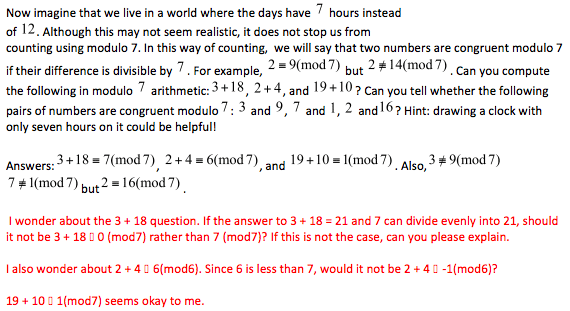| |||
| Math Central | Quandaries & Queries |
|
I am editing a resource for students, and I think some of the answers may be incorrect. The text I was given and my questions are in the attachment. Any help you could give would be appreciated. Thanks, Kim |
Here is what Kim sent.

Hi Kim,
In the next to the last line of what you sent you have mod6, I assume that is a typo and should be mod7.
One of the challenges of working with modular arithmetic is that a question might have many different, correct answers. For example in your test is the true statement that $2 \equiv 9$(mod 7) but it is also true that $2 \equiv 16$(mod 7), $2 \equiv 23$(mod 7) and $2 \equiv -5$(mod 7). In fact 2 is equivalent to 2 plus or minus any multiple of 7, modulo 7. Hence the statement in the text that $3 + 18 \equiv 7$(mod 7) and your statement that $3 + 18 \equiv 0$(mod 7) are both true.
It is conventional that when performing a calculation modulo 7, the answer be given as a number between 0 and 6 inclusive. Hence I would prefer your answer that $3 + 18 \equiv 0$(mod 7). For the same reason I would prefer the answer in the text that states $2 + 4 \equiv 6$(mod 7) to your, nevertheless true statement, that $2 + 4 \equiv -1$(mod 7).
Harley
 |
||
Math Central is supported by the University of Regina and The Pacific Institute for the Mathematical Sciences.